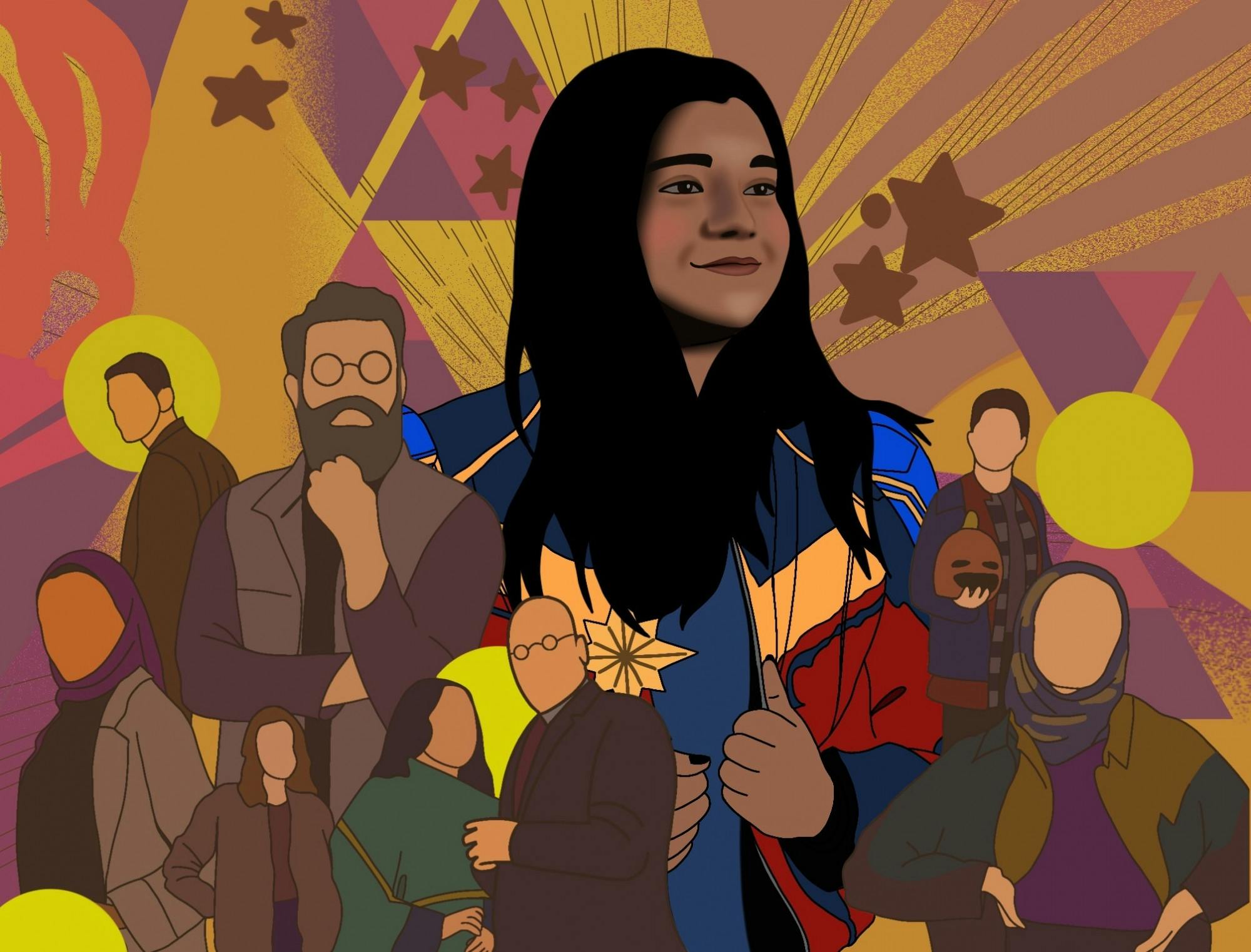Warning spoilers for Marvel Studios’ “Ms. Marvel”
Kamala Khan – a Pakistani, Muslim girl like me, except she has superpowers.

Illustration by Madison Echlin.
Warning spoilers for Marvel Studios’ “Ms. Marvel”
Kamala Khan – a Pakistani, Muslim girl like me, except she has superpowers.
I like to think I have superpowers too, but the journalist kind.
In fact, my last name is Kamal, which is close enough to Kamala and, thus, I am even closer to being the superhero I’ve always wanted to be.
I loved “Ms. Marvel.” And, yes, I have my problems with the show but I’ve never seen mainstream Pakistani representation in a television show or movie, which, for me, supersedes the iffy parts of “Ms. Marvel.”
In addition, the show has a 98% Rotten Tomatoes score, the highest score of all Disney’s Marvel properties, and, yes, Rotten Tomato scores are debatable, but I am immensely proud my people are at the forefront of this critical acclaim.
I’m really happy little Pakistani kids living in the west will see a badass on-screen – a badass that looks like them and also eats biryani for dinner.
Khan is a first-generation American with immigrant parents and she also failed her driver’s test – just like me.
But can we talk about the music in “Ms. Marvel?”
“Pasoori, Peechay Hut, Tu Jhoom” – are all phenomenal songs from Pakistan’s Coke Studios.
Thank you, Laura Karpman, for this soundtrack.
Also, I can’t forget the incorporation of “Dil Bole Hadippa,” a Bollywood song, during the reception of Khan’s brother, Aamir’s, wedding, which was overall a fun depiction of Pakistani weddings.
I deserved to see more Tyesha, a covert or revert to Islam who wears a hijab.
Netflix, take notes (*cough cough* Nadia from “Elite”). Nakia and Tyesha found power, comfort and their self-identity by wearing the hijab – something a lot of hijab-wearing Muslim women relate to.
However, even with its excellent soundtrack and cultural depictions or anecdotes, “Ms. Marvel” made a risky attempt to tie Khan’s power directly to her heritage and this attempt did not work.
The Clandestines plot was foolish and calling the Clandestines “Djinn” in episode three – just to debunk Khan’s “Djinn-ness” in episode four – was unnecessary and confusing while playing into orientalist exoticizing tropes about Brown people.
“Aladdin” had enough of that. We don’t need more, Disney.
Ms. Marvel’s attempt to tie Khan’s power source to her heritage was ultimately a bad decision because Khan’s original portrayal in the comics shows her to be an inhuman, already making a connection between Khan’s heritage and ancestry.
But, Khan is not an inhuman in this show. She should have been.
Further, the Clandestines plot, mostly happening in Karachi, Pakistan, is simply thrown in the show to have a sort-of “villain,” when “Ms. Marvel” should have been focused on the United States Department of Damage Control and ensuing, systemic Islamophobia.
Support student media! Please consider donating to The State News and help fund the future of journalism.
That is the issue – “Ms. Marvel” attempted to shove a lot of plots into its first season, doing a disservice to Khan’s heritage and her life in the United States.
Further, the Clandestines plot truly does not have any use, when episode six reveals Khan is a “mutant” (a.k.a. the introduction of X-Men in the Marvel Cinematic Universe).
I like that the first mutant is a Pakistani Muslim girl. Hopefully, Khan doesn’t get sidelined by the introduction of the comics’ mainstream mutants like Rogue, Gambit, Storm, Wolverine, Magneto and Professor-X.
If you’re gonna make her a mutant, make her an important one.
Regardless of the original intent to make Khan a mutant in the comics, Khan being an inhuman perfectly worked for her individual story and in-her-favor of her solo comic-runs.
“Ms. Marvel” sets out to answer, “Who are Pakistanis?” and “Where does Khan get her powers?” But the show provides no answer to either of those questions.
Khan’s best moments are with her family and friends in Karachi and New Jersey, but the cramming of two plots – damage control and Clandestines – hurts the core of Khan’s story.
Instead, season two of “Ms. Marvel” should have explored the partition between modern-day India and Pakistan, with the exposition built in season one and the upcoming film, “The Marvels.”
I don’t think the partition between modern-day India and Pakistan should have been explored in two episodes.
Time travel would have been an interesting way to explore pre-partition India and Pakistan if viewers had gotten more time in Karachi.
However, I did enjoy watching Pakistani actors, Fawad Khan and Mehwish Hayat, interact and do their on-screen magic. Their characters, Hassan and Aisha, are the perfect couple.
Farhan Akhtar’s Waleed was also fun to watch.
I can’t forget about that mid-credit scene where Khan and Carol Danvers switch places, with Khan now seemingly in-space and Danvers in the room of an ultimate fangirl.
But, I can forget about that awful scene featuring the police “defending” Khan from the racist, Islamophobic Damage Control.
To that end, I invite you to read about the New York Police Department settling a suit in 2018 because it surveilled 20 mosques, 14 restaurants, 11 stores, two schools and two Muslim student groups in New Jersey alone.
373 more days until “The Marvels” and I could not be more excited to see Ms.Marvel, Captain Marvel and Photon share the big screen.
As they say … Pakistan Zindabad.